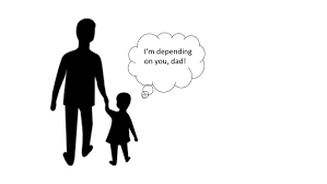 An independent clause is a complete sentence, while a dependent clause can't stand alone and must lean on an independent clause for support. Stay tuned as I add dependent clauses to independent clauses to magically create descriptive sentences! EXAMPLE #1: DEPENDENT CLAUSE = when I walked the dog yesterday "I" is the subject and "walked" is the verb, but we don't know what happened! If I answer that, the transformation to a complete sentence will be complete. INDEPENDENT CLAUSE = I almost stepped on a ribbon snake! That really happened, much to my shock and dismay! The magic happens when you connect them: When I walked the dog yesterday, I almost stepped on a ribbon snake! EXAMPLE #2: DEPENDENT CLAUSE = after Joanna opened the letter "Joanna" is the subject and "opened" is the verb. But we don't know what happened! And I don't know about you, but I want to know more about the letter itself, too. INDEPENDENT CLAUSE = She danced for joy. That's wonderful. But why? The dependent clause, with added detail, will fill in the blanks. Abra-Cadabra!! After Joanna opened the acceptance letter from her number one college choice, she danced for joy. Best of luck to all the college applicants out there, as well as to all students currently grappling with remote and hybrid learning. If you have any grammar, punctuation, or vocabulary questions, please feel free to ask. Your question could spark a new spoonful! Take care, Laura Fineberg Cooper A Spoonful of Grammar
2 Comments
11/16/2020 05:57:02 pm
Great examples and explanations, Laura. You certainly know how to make learning fun. Careful of those ribbon snakes--yikes!
Reply
11/16/2020 06:09:34 pm
Dear Marcia,
Reply
Leave a Reply. |
Welcome to
|
 RSS Feed
RSS Feed
